Assignment on Nutrition Diploma
Added on 2020-05-01
22 Pages5006 Words58 Views
Running head- NUTRITION DIPLOMA
Assignment 14
Name of the Student
Name of the University
Author Note
Assignment 14
Name of the Student
Name of the University
Author Note

1NUTRITION DIPLOMA
Answer 1
A vegetarian abstains from consumption of flesh, meat, seafood, poultry and other animals.
Vegetarians generally abstain from consuming any by-products of animal slaughter. The
vegetarian diet became popular in the England during the early part of the 19th century. The
Vegetarian Society was founded during that time and had religious associations. The conversion
to vegetarian diet has been ever increasing since then. A vegetarian lives on a diet that consists of
pulses, grains, nuts, seeds, legumes, fruits, vegetables, fungi, and other non-animal food
products. They also focus on consumption of dairy products. Research evidences suggest that
vegan diet confers several advantages to the health outcomes of people who follow them and
also helps in eliminating the incidence of several potentially fatal diseases. These diets provide
adequate nutrition to the concerned person and prevent ill health. Several nutritional deficiencies
can lead to the occurrence of ill health outcomes1.
The vegetarian diets contain low amounts of saturated fats. They are rich in fiber and contain
several phytochemicals that work together in preventing cancer. Furthermore, they also help in
reducing heart diseases. Food derived from animal sources act as rich source of saturated fats and
adds cholesterol to the body. The presence of fibers in vegan diet helps in lowering cholesterol
1 Shridhar, Krithiga, Preet Kaur Dhillon, Liza Bowen, Sanjay Kinra, Ankalmadugu Venkatsubbareddy Bharathi,
Dorairaj Prabhakaran, Kolli Srinath Reddy, Shah Ebrahim, and Indian Migration Study Group. "The association
between a vegetarian diet and cardiovascular disease (CVD) risk factors in India: the Indian Migration Study." PloS
one 9, no. 10 (2014): e110586.
Answer 1
A vegetarian abstains from consumption of flesh, meat, seafood, poultry and other animals.
Vegetarians generally abstain from consuming any by-products of animal slaughter. The
vegetarian diet became popular in the England during the early part of the 19th century. The
Vegetarian Society was founded during that time and had religious associations. The conversion
to vegetarian diet has been ever increasing since then. A vegetarian lives on a diet that consists of
pulses, grains, nuts, seeds, legumes, fruits, vegetables, fungi, and other non-animal food
products. They also focus on consumption of dairy products. Research evidences suggest that
vegan diet confers several advantages to the health outcomes of people who follow them and
also helps in eliminating the incidence of several potentially fatal diseases. These diets provide
adequate nutrition to the concerned person and prevent ill health. Several nutritional deficiencies
can lead to the occurrence of ill health outcomes1.
The vegetarian diets contain low amounts of saturated fats. They are rich in fiber and contain
several phytochemicals that work together in preventing cancer. Furthermore, they also help in
reducing heart diseases. Food derived from animal sources act as rich source of saturated fats and
adds cholesterol to the body. The presence of fibers in vegan diet helps in lowering cholesterol
1 Shridhar, Krithiga, Preet Kaur Dhillon, Liza Bowen, Sanjay Kinra, Ankalmadugu Venkatsubbareddy Bharathi,
Dorairaj Prabhakaran, Kolli Srinath Reddy, Shah Ebrahim, and Indian Migration Study Group. "The association
between a vegetarian diet and cardiovascular disease (CVD) risk factors in India: the Indian Migration Study." PloS
one 9, no. 10 (2014): e110586.
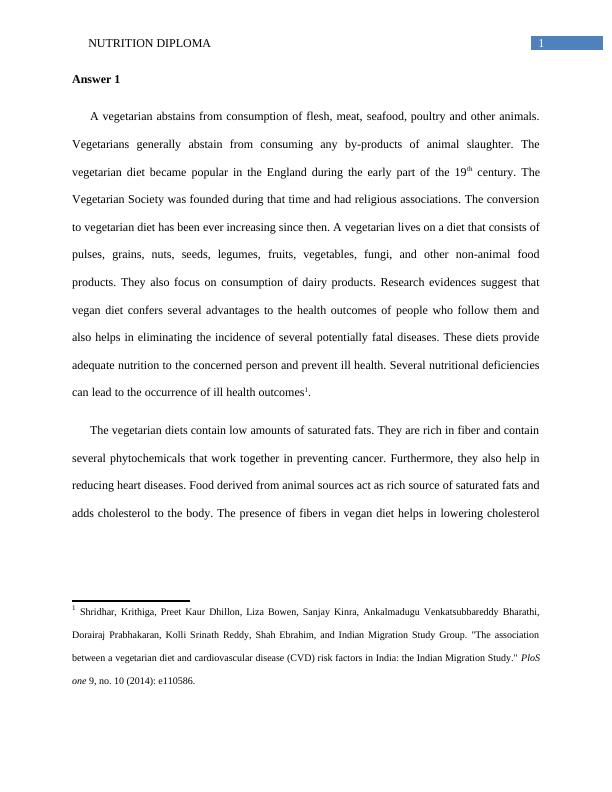
2NUTRITION DIPLOMA
levels. These low fat and high fiber diet also lower blood pressure2. The four types of vegetarian
diets followed by vegans are mentioned below-
Vegan- This diet is followed by people who abstain from consumption of animal
products and are associated with a philosophy that rejects commodity status of all
animals. They do not consume any animal derived substances. Vegan diets help in
reducing the risk of chronic diseases. They exclude eggs, dairy products as well as honey
from their diet. They only eat vegetables and fruits3.
Lacto vegetarian- This kind of diet includes vegetables, dairy products such as, cheese,
milk, butter, yoghurt, ghee, kefir and cream. This diet excludes eggs. They do not
consume seafood, fish or fowl. The concept of following a lacto-vegetarian diet is
popular among countries that follow Eastern religious traditions. It is focused on non-
violence towards any form of animal life. However, the primary difference between
vegans and lacto-vegetarian lies in the fact that core vegans avoid dairy products owing
to their belief that production of dairy food causes suffering or premature death of the
animals4.
2 Pilis, Wiesław, Krzysztof Stec, Michał Zych, and Anna Pilis. "Health benefits and risk associated with adopting a
vegetarian diet." Roczniki Państwowego Zakładu Higieny 65, no. 1 (2014).
3 Zimmer, Jasmin, Bettina Lange, Julia-Stefanie Frick, Helene Sauer, Kurt Zimmermann, Andreas Schwiertz,
Kerstin Rusch, Sibylle Klosterhalfen, and Paul Enck. "A vegan or vegetarian diet substantially alters the human
colonic faecal microbiota." European journal of clinical nutrition 66, no. 1 (2012): 53-60.
4 De Filippis, Francesca, Lucia Vannini, Antonietta La Storia, Luca Laghi, Paola Piombino, Giuseppina Stellato,
Diana I. Serrazanetti et al. "The same microbiota and a potentially discriminant metabolome in the saliva of
omnivore, ovo-lacto-vegetarian and vegan individuals." PLoS One 9, no. 11 (2014): e112373.
levels. These low fat and high fiber diet also lower blood pressure2. The four types of vegetarian
diets followed by vegans are mentioned below-
Vegan- This diet is followed by people who abstain from consumption of animal
products and are associated with a philosophy that rejects commodity status of all
animals. They do not consume any animal derived substances. Vegan diets help in
reducing the risk of chronic diseases. They exclude eggs, dairy products as well as honey
from their diet. They only eat vegetables and fruits3.
Lacto vegetarian- This kind of diet includes vegetables, dairy products such as, cheese,
milk, butter, yoghurt, ghee, kefir and cream. This diet excludes eggs. They do not
consume seafood, fish or fowl. The concept of following a lacto-vegetarian diet is
popular among countries that follow Eastern religious traditions. It is focused on non-
violence towards any form of animal life. However, the primary difference between
vegans and lacto-vegetarian lies in the fact that core vegans avoid dairy products owing
to their belief that production of dairy food causes suffering or premature death of the
animals4.
2 Pilis, Wiesław, Krzysztof Stec, Michał Zych, and Anna Pilis. "Health benefits and risk associated with adopting a
vegetarian diet." Roczniki Państwowego Zakładu Higieny 65, no. 1 (2014).
3 Zimmer, Jasmin, Bettina Lange, Julia-Stefanie Frick, Helene Sauer, Kurt Zimmermann, Andreas Schwiertz,
Kerstin Rusch, Sibylle Klosterhalfen, and Paul Enck. "A vegan or vegetarian diet substantially alters the human
colonic faecal microbiota." European journal of clinical nutrition 66, no. 1 (2012): 53-60.
4 De Filippis, Francesca, Lucia Vannini, Antonietta La Storia, Luca Laghi, Paola Piombino, Giuseppina Stellato,
Diana I. Serrazanetti et al. "The same microbiota and a potentially discriminant metabolome in the saliva of
omnivore, ovo-lacto-vegetarian and vegan individuals." PLoS One 9, no. 11 (2014): e112373.
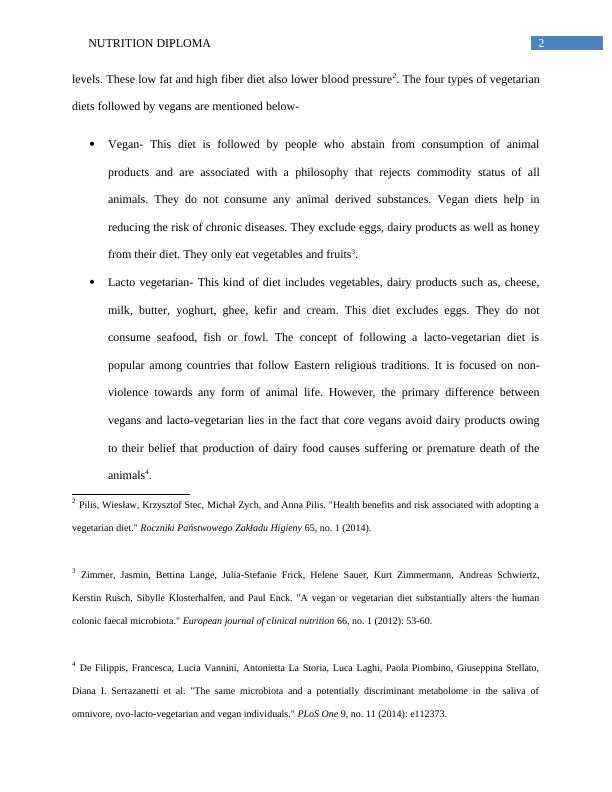
3NUTRITION DIPLOMA
Ovo-lacto vegetarian- These vegetarians do not consume meat. However, they consume
some animal products such as, dairy and eggs. They abstain from consumption of fish
and seafood. A typical ovo-lacto vegetarian diet includes vegetables, fruits, nuts, grains,
herbs, seeds, fungi, roots, cheese, milk, kefir, yoghurt and eggs. Ovo-lacto vegetarians are
more commonly found in the Western world5.
Semi-vegetarian- This diet is based primary based on plant products with occasional
inclusion of flesh and meat. This diet is also known as flexitarian diet. These people
cannot be called a strict vegetarian, however, they have cut down the amount of meat
consumption, and generally abstain from having red meat. Their diet includes eggs, fish,
fruits, vegetables, dairy products and poultry6.
Answer 2
Vitamin B12 is also known as cobalamine and plays an essential role in controlling the
normal brain functioning. It is generally involved in controlling the metabolism of all cells of the
human body. This water soluble vitamin occurs naturally in some food items and is also
available in the form of dietary supplements. Owing to the presence of the mineral cobalt, it is
often referred to as cobalamine. The two forms of vitamin B12 that are active in human
5 Ha, Vanessa, and Russell J. de Souza. "“Fleshing out” the benefits of adopting a vegetarian diet." (2015): e002654.
6 Dinu, Monica, Rosanna Abbate, Gian Franco Gensini, Alessandro Casini, and Francesco Sofi. "Vegetarian, vegan
diets and multiple health outcomes: a systematic review with meta-analysis of observational studies." Critical
reviews in food science and nutrition 57, no. 17 (2017): 3640-3649.
Ovo-lacto vegetarian- These vegetarians do not consume meat. However, they consume
some animal products such as, dairy and eggs. They abstain from consumption of fish
and seafood. A typical ovo-lacto vegetarian diet includes vegetables, fruits, nuts, grains,
herbs, seeds, fungi, roots, cheese, milk, kefir, yoghurt and eggs. Ovo-lacto vegetarians are
more commonly found in the Western world5.
Semi-vegetarian- This diet is based primary based on plant products with occasional
inclusion of flesh and meat. This diet is also known as flexitarian diet. These people
cannot be called a strict vegetarian, however, they have cut down the amount of meat
consumption, and generally abstain from having red meat. Their diet includes eggs, fish,
fruits, vegetables, dairy products and poultry6.
Answer 2
Vitamin B12 is also known as cobalamine and plays an essential role in controlling the
normal brain functioning. It is generally involved in controlling the metabolism of all cells of the
human body. This water soluble vitamin occurs naturally in some food items and is also
available in the form of dietary supplements. Owing to the presence of the mineral cobalt, it is
often referred to as cobalamine. The two forms of vitamin B12 that are active in human
5 Ha, Vanessa, and Russell J. de Souza. "“Fleshing out” the benefits of adopting a vegetarian diet." (2015): e002654.
6 Dinu, Monica, Rosanna Abbate, Gian Franco Gensini, Alessandro Casini, and Francesco Sofi. "Vegetarian, vegan
diets and multiple health outcomes: a systematic review with meta-analysis of observational studies." Critical
reviews in food science and nutrition 57, no. 17 (2017): 3640-3649.
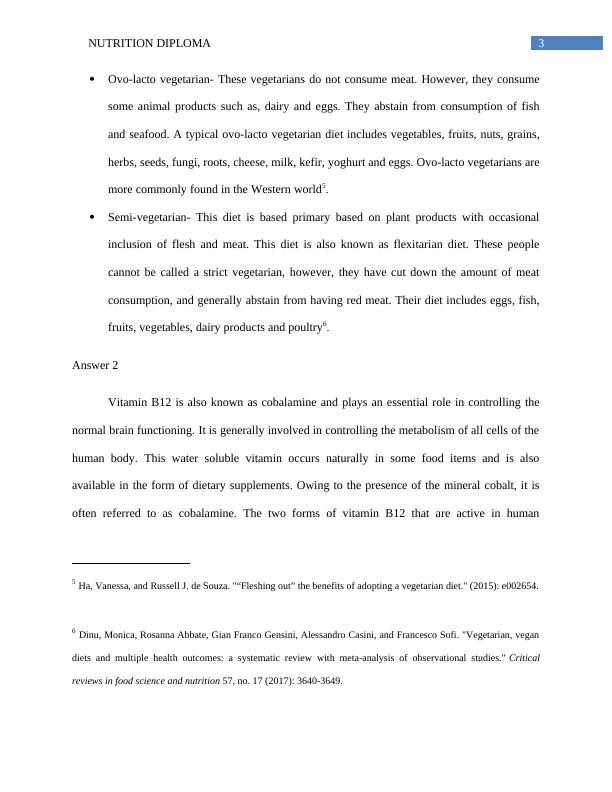
4NUTRITION DIPLOMA
metabolism are 5-deoxyadenosylcobalamine and methylcobalamine7. It also assists in the
formation of red blood cells and synthesis of DNA. Vitamin B12 is one of the most essential
components of a vegetarian diet and also plays an essential role in maintaining the medullary
sheath that surrounds the nerve fibers. Vitamers are chemical compounds present in vitamin B12
that have pharmacological activity.
Lack of vitamin B12 in the diet results in irreversible damage to the nervous system and
leads to the occurrence of several deficiency disorders. Levels of vitamin B12 lower than the
normal values cause lethargy, fatigue, memory loss, headache, breathlessness, and pale skin
among the elderly8. Deficiency diseases occur due to low intake of vitamin B12 along with
intestinal disorders, malabsorption and effect of certain medications. Vegetarians likely suffer
from such deficiency disorders due to the lack of this vitamin in plant sources. Infants, born to
vegetarian mothers are always at an increased risk of suffering from such disorders. Elderly
population with limited intake of animal products and meat are also vulnerable to such
deficiencies9. The estimated average requirements are 2.0μg/day and the recommended dietary
7 Watanabe, Fumio, Yukinori Yabuta, Tomohiro Bito, and Fei Teng. "Vitamin B12-containing plant food sources
for vegetarians." Nutrients 6, no. 5 (2014): 1861-1873.
8 Dangour, Alan D., Elizabeth Allen, Robert Clarke, Diana Elbourne, Astrid E. Fletcher, Louise Letley, Marcus
Richards, Ken Whyte, Ricardo Uauy, and Kerry Mills. "Effects of vitamin B-12 supplementation on neurologic and
cognitive function in older people: a randomized controlled trial." The American journal of clinical nutrition 102,
no. 3 (2015): 639-647.
9 Pawlak, Roman, Scott James Parrott, Sudha Raj, Diana Cullum-Dugan, and Debbie Lucus. "How prevalent is
vitamin B12 deficiency among vegetarians?." Nutrition reviews 71, no. 2 (2013): 110-117.
metabolism are 5-deoxyadenosylcobalamine and methylcobalamine7. It also assists in the
formation of red blood cells and synthesis of DNA. Vitamin B12 is one of the most essential
components of a vegetarian diet and also plays an essential role in maintaining the medullary
sheath that surrounds the nerve fibers. Vitamers are chemical compounds present in vitamin B12
that have pharmacological activity.
Lack of vitamin B12 in the diet results in irreversible damage to the nervous system and
leads to the occurrence of several deficiency disorders. Levels of vitamin B12 lower than the
normal values cause lethargy, fatigue, memory loss, headache, breathlessness, and pale skin
among the elderly8. Deficiency diseases occur due to low intake of vitamin B12 along with
intestinal disorders, malabsorption and effect of certain medications. Vegetarians likely suffer
from such deficiency disorders due to the lack of this vitamin in plant sources. Infants, born to
vegetarian mothers are always at an increased risk of suffering from such disorders. Elderly
population with limited intake of animal products and meat are also vulnerable to such
deficiencies9. The estimated average requirements are 2.0μg/day and the recommended dietary
7 Watanabe, Fumio, Yukinori Yabuta, Tomohiro Bito, and Fei Teng. "Vitamin B12-containing plant food sources
for vegetarians." Nutrients 6, no. 5 (2014): 1861-1873.
8 Dangour, Alan D., Elizabeth Allen, Robert Clarke, Diana Elbourne, Astrid E. Fletcher, Louise Letley, Marcus
Richards, Ken Whyte, Ricardo Uauy, and Kerry Mills. "Effects of vitamin B-12 supplementation on neurologic and
cognitive function in older people: a randomized controlled trial." The American journal of clinical nutrition 102,
no. 3 (2015): 639-647.
9 Pawlak, Roman, Scott James Parrott, Sudha Raj, Diana Cullum-Dugan, and Debbie Lucus. "How prevalent is
vitamin B12 deficiency among vegetarians?." Nutrition reviews 71, no. 2 (2013): 110-117.
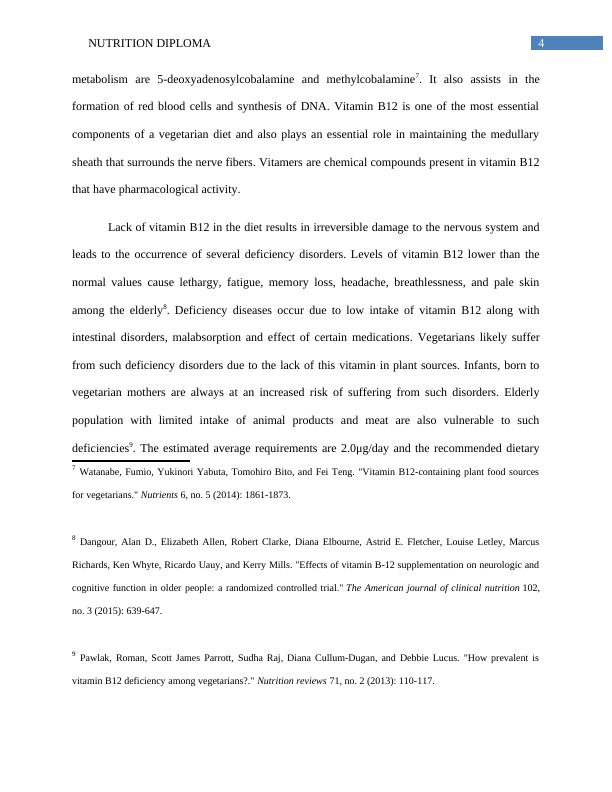
5NUTRITION DIPLOMA
allowances are 2.4 μg/day, as advised by the U.S. Institute of Medicine (IOM). The adequate
level for infants is considered to be around 0.4–0.5 μg/day.
Sources of vitamin B12- It is principally found in animal sources such as, milk, meat,
eggs and liver. This vitamin is stored in the liver and muscle of animals. Bioavailability of
vitamin B12 is 40-60% from fowl, fish and meat, compared to <9% from eggs. The major animal
sources that contain significant amount of vitamin B12 are organ meats, lamb, turkey, beef,
mackerel, clams, fish eggs, and crab meat.
It is also found among prokaryotes such as archaea and other bacteria. Gut bacteria
present in animals and humans synthesize this vitamin. However, human beings are not able to
absorb it due to the large distance between the small intestine and the colon. The fortified foiods
consumed by vegans also contain high amounts of this vitamin, such as, soy products, cereals,
nutritional yeast and energy bars. Vitamin B12 supplements are available in the form of pills and
are used for enriching foods such as, pasta and bread10. Certain species of mushroom, tempeh
and algae are also considered to be rich sources of vitamin B12, although, they have not been
tested in human trials. The human body stores vitamin B12 for as long as five years and it gets
reabsorbed after secretion in the bile. The inability of the human body to absorb adequate
vitamins also results in pernicious anaemia, neurological damage and can even be fatal.
Answer 3
A vegetarian diet is associated with an increased consumption of folic acid, fibers, vitamin E,
vitamin B, unsaturated fats, magnesium and several phytochemicals. Several studies have shown
10 Stabler, Sally P. "Vitamin B12 deficiency." New England Journal of Medicine 368, no. 2 (2013): 149-160.
allowances are 2.4 μg/day, as advised by the U.S. Institute of Medicine (IOM). The adequate
level for infants is considered to be around 0.4–0.5 μg/day.
Sources of vitamin B12- It is principally found in animal sources such as, milk, meat,
eggs and liver. This vitamin is stored in the liver and muscle of animals. Bioavailability of
vitamin B12 is 40-60% from fowl, fish and meat, compared to <9% from eggs. The major animal
sources that contain significant amount of vitamin B12 are organ meats, lamb, turkey, beef,
mackerel, clams, fish eggs, and crab meat.
It is also found among prokaryotes such as archaea and other bacteria. Gut bacteria
present in animals and humans synthesize this vitamin. However, human beings are not able to
absorb it due to the large distance between the small intestine and the colon. The fortified foiods
consumed by vegans also contain high amounts of this vitamin, such as, soy products, cereals,
nutritional yeast and energy bars. Vitamin B12 supplements are available in the form of pills and
are used for enriching foods such as, pasta and bread10. Certain species of mushroom, tempeh
and algae are also considered to be rich sources of vitamin B12, although, they have not been
tested in human trials. The human body stores vitamin B12 for as long as five years and it gets
reabsorbed after secretion in the bile. The inability of the human body to absorb adequate
vitamins also results in pernicious anaemia, neurological damage and can even be fatal.
Answer 3
A vegetarian diet is associated with an increased consumption of folic acid, fibers, vitamin E,
vitamin B, unsaturated fats, magnesium and several phytochemicals. Several studies have shown
10 Stabler, Sally P. "Vitamin B12 deficiency." New England Journal of Medicine 368, no. 2 (2013): 149-160.
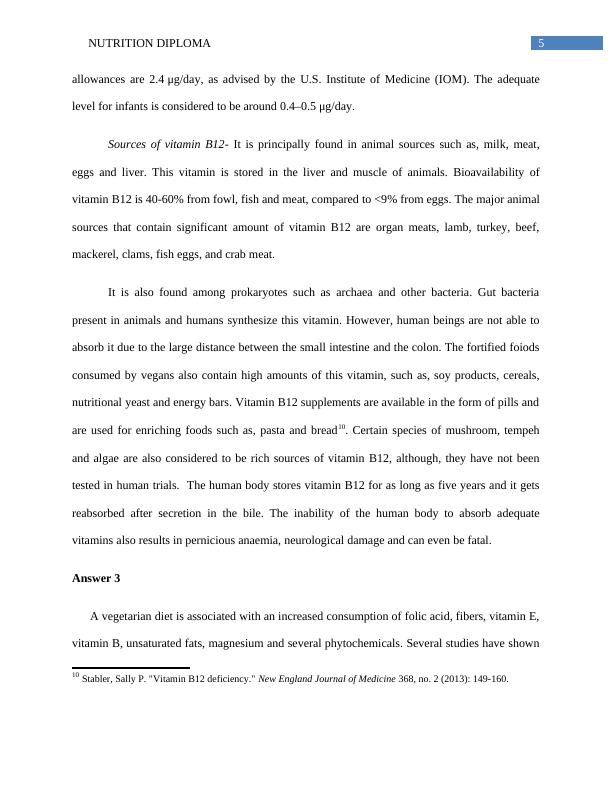
End of preview
Want to access all the pages? Upload your documents or become a member.
Related Documents
Nutrition - Lacto-ovo Vegetarian Foodlg...
|4
|818
|25
Prepare Food to Meet Special Dietary Requirementslg...
|10
|2072
|476
Vegetarian and Vegan Diets in Children Adolescents Project 2022lg...
|9
|1752
|22
The Importance of Veganism in Preventing and Managing Lifestyle Diseaseslg...
|9
|2301
|344
Consequences of Vegan Diet on Health of London Consumerslg...
|10
|2686
|83
Food Nutrition | Assignment-1lg...
|9
|1800
|12
